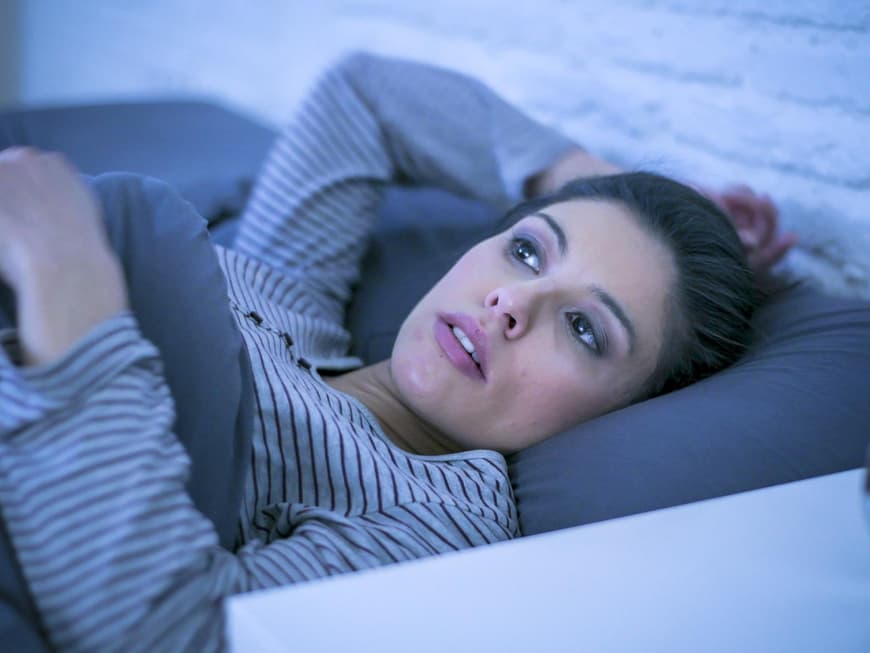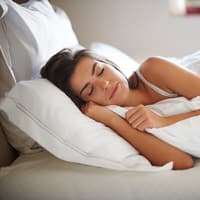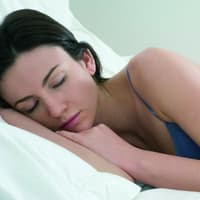
Healthy sleep is so important, and we notice this especially when we have slept badly. For example, we then lose concentration, become irritable more quickly and our performance decreases. After a restless night, however, signs of exhaustion, listlessness, a persistent feeling of sleepiness, nervousness, increased appetite or headaches can also become noticeable.
At night, the body needs rest, for example to regulate the metabolism, and the body's own cells are also renewed. Our brain also processes important information during sleep and stores it in our long-term memory. Good sleep is essential to maintain our performance, to feel rested and refreshed the next day and to cope with everyday life. Persistent sleep disorders can increase the risk of obesity, heart disease, depression and diabetes. Anyone who suffers from persistent sleep disorders should consult a doctor so that they can find out the cause and make a diagnosis.
From the age of 50, women in particular often experience sleep problems. One of the reasons for this is the drop in oestrogen levels during the menopause.
Causes of sleep problems
Sleep problems can have many different causes, for example
- Noise: such as disturbing environmental noises or your partner snoring
- Stress or stressful situations in your professional or private life can affect your night's sleep
- Health problems: for example, colds or pain
- The wrong temperature in the bedroom
- Stimulating sport before going to bed, such as a cardio workout
- eating too much and too late before going to bed
- Media use: such as watching an upsetting movie before going to sleep
- medication
- alcohol consumption
- Illnesses, such as rheumatism or restless legs syndrome, can also lead to sleep disorders
What sleep problems are there?
The most common type is probably insomnia, which translates as "sleeplessness". This mainly includes problems falling asleep or staying asleep, such as problems falling asleep. Those affected can also sleep, but with many interruptions, for example. They often wake up again and again and generally have restless and poor sleep. It is also problematic if someone frequently lies awake for several hours at night. If sleep is always too short, this is known as sleep deprivation.
In the long term, for example, insomnia can lead to those affected also feeling chronically tired during the day, having difficulty concentrating and being afraid of not being able to fall asleep in the evening.
Tips for healthy sleep
Some factors disrupt our sleep or have a negative effect on the quality of our sleep. Here are a few tips for restful sleep:
1. create a quiet place to sleep. Noise is a real sleep killer.
2. ban cell phones, laptops, tablets and the like from the bedroom, as they are not particularly conducive to a good night's sleep. This is due to the so-called bluelight of the display. This is unnaturally bright and disrupts the release of the sleep hormone melatonin. Studies confirm that REM sleep can be significantly reduced if you use electronic media shortly before going to bed
3. ensure a comfortable sleeping temperature, ideally around 16 to 19 °C.
4. try to avoid anything that can trigger stress before going to sleep. A little meditation, yoga before going to sleep or autogenic training can help you relax. Tip: 30 minutes before going to bed, it is best to switch to a relaxing activity, such as reading a book.
5. darken the room sufficiently so that you are not woken up by the disturbing light of street lamps or by the rising sun at four o'clock in the morning.
>> For restful nights: The best plants for the bedroom
How many hours should you sleep regularly?
According to the US National Health Foundation, the optimal amount of sleep depends on how old you are. In the current "Sleep Journal", the researchers explained that adults between the ages of 26 and 64 need around 7 to 9 hours of sleep to feel fit and balanced. The researchers also recommend that young adults sleep for 7 to 9 hours and seniors aged 65 and over should ideally rest for 7 to 8 hours. It is also important to listen to our bodies and go to bed when we are tired. Incidentally, everyone has their own individual sleep rhythm: some people are tired early, others don't go to sleep until 2 a.m.
>> More under: How many hours of sleep are optimal for your age?
The sleep phases
At night, our body goes through different sleep phases. Deep sleep phases alternate with phases of light sleep.
The falling asleep phase: As the name suggests, we fall asleep during this period. For some people, this only lasts a few minutes, for others half an hour, for example.
The lightsleep phase: This phase begins immediately after we fall asleep. It can be a transition between wakefulness and the deep sleep phase as well as between the deep sleep phase and the REM sleep phase (dream sleep phase).
The deep sleep phase: In this sleep phase, breathing and heartbeat slow down, and body temperature and blood pressure also drop. The body shuts down, so to speak, in order to regenerate itself. Sleepers in this phase are difficult to wake up. Moreover, the deep sleep phase is particularly important for healthy and restful sleep.
The REM sleep phase: This phase is also known as the dream sleep phase. Our brain is particularly active in this sleep phase, while our body, especially our muscles, is extremely relaxed. Sleepers are even harder to wake up in this phase than in the deep sleep phase, as the brain processes important information in the REM phase and external stimuli are blocked out.
Is it advisable to take sleeping pills for sleep disorders and what does treatment look like?
Sleeping pills, both over-the-counter and prescription, should only be taken after consulting your GP. Some prescription drugs have a habituation effect and can even be addictive. You should also check with your doctor whether you have any intolerances to certain medications or ingredients, including over-the-counter preparations.
In general, a visit to the doctor is advisable if you suffer from chronic sleep problems and have the feeling that the situation is not improving. The doctor can make a diagnosis or refer you to a specialist. Depending on the diagnosis, an individual therapy will then be started to get the sleep disorders under control. This can include anything from autogenic training and breathing therapy to light therapy or the use of over-the-counter or prescription medication. It always depends on the individual case.
Author: Ilka-Marie Hagenbücher






